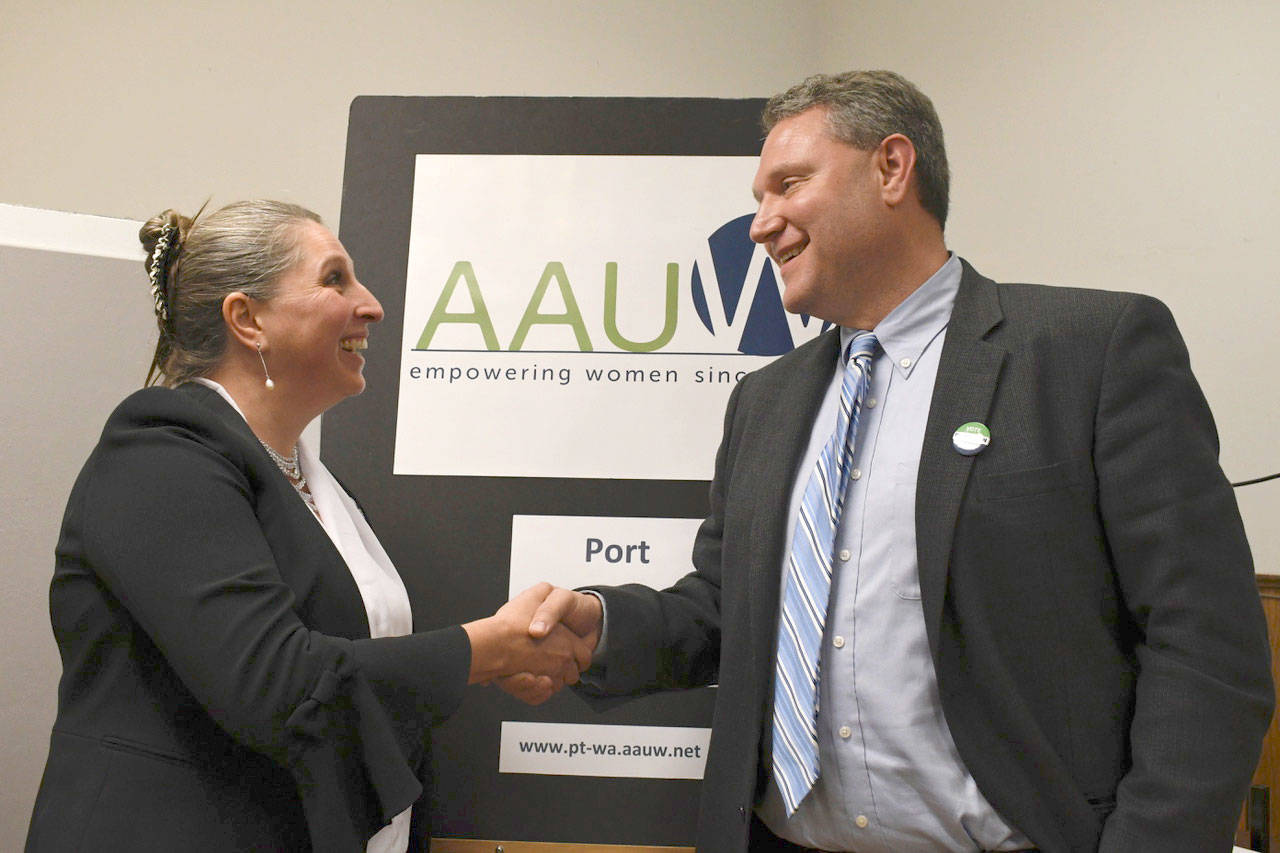CHIMACUM — Candidates for District Court judge discussed their experience, qualifications and goals for the position during a League of Women Voters/American Association of University Women general election forum.
The Thursday forum was at the Tri-Area Community Center on Thursday evening.
District Court Judge candidates Noah Harrison, 44, and Mindy Walker, 42, focused on their different experiences on the bench as they face off in the Nov. 6 general election.
They hope to fill the position held by Judge Jill Landes for the past 12 years. Landes announced her retirement in January.
Harrison, 44, has been a substitute judge in Jefferson County for seven years, serving in District Court or Superior Court as a commissioner or a judge pro-tem.
“I’ve heard a thousand cases, presided over civil and criminal trials, drug court, mental health court, juvenile court, and all the rehabilitative courts,” Harrison said.
“My endorsements have seen me on the bench, those who have seen me as an attorney. Those are the people I’ve fought with, the ones I rule against. They endorsed me. The majority of attorneys in Jefferson County, judges. I have almost unanimous support of law enforcement. I’ve been fighting with cops and prosecutors for the last 14 years.”
Walker, 42, is an attorney practicing in Port Townsend and serves as judge pro-tem on Bainbridge Island and in Kitsap County. She also has appeared in federal court.
“I’m committed to being here. I worked in Jefferson County, in Western Washington and in tribal court,” she said. “I have gained experience by going to other courts and appearing before several judges.
“I have new ideas for policies and procedures. I plan to take some of those ideas and make sure everyone is treated with respect, fairly and neutrally,” she added.
”I want to make sure everyone has access to justice, and the right to appeal.
Walker and Harrison both believe in widening opportunities for those with suspended driver’s licenses.
“I believe strongly that what makes recidivism so high is poverty,” Harrison said. “They pay a fine or fee and have their license pulled. After they are charged, we should consider putting fines and fees in collection, set up a payment plan, or reduce them.
“It is mandatory to find out whether a person is able to pay those fees. It’s our job to find out if they can afford to pay. We should help people to get licensed, to get insurance.”
Walker said a driver’s license is suspended for many reasons.
“A District Court judge can help folks get their license back,” she said. “Some of the residents live out on the West End. They have to come to court. How do we help them?
“I am trying to reach out to the West End to have better access to justice. We can provide community service. There are new studies for re-licensing programs and payment plans and I’m excited to look into those programs.”
The candidates disagreed on the need for a judge to write opinion memorandums.
Walker believes opinion memorandums are an important part of the court record.
“It outlines why a judge rules the way they ruled. That document can be used to protect a person’s right to appeal to the next court level,” she said. “I’ve heard from attorneys and judges that are horrified that it isn’t happening here.
“The reason they don’t like it is because it’s difficult to appeal cases up if that opinion memorandum is not there. The other reason, it offers some transparency to the judge. Then your rulings are on display for anyone who wants to see them. If they are reviewed by another judge, it offers transparency on the bench.”
Harrison said opinion memorandums are not that helpful.
“I’m not opposed to memorandums of opinion, I’ve written them,” he said. “It’s not best practice. It does happen here. It happens when it’s necessary, not when it sounds good. There’s nothing wrong with writing them, but it does not help appellate rights and it does not help with transparency.
“Every judge’s ruling is reviewed. There is a video tape. That court doesn’t care what’s on the writing, the court looks at the hearing itself. My experience and all the judges I’ve come in contact with do not do that.”
The candidates agreed that a greater use of technology in the courts would increase access to records.
Harrison questioned Walker’s experience.
“Just because someone said they have done something, the next question is what differences are you actually going to bring here?”he asked.
”What are those changes that you’ve seen in other counties? There are rules and procedures, yes they have their own culture, but they operate very similar in the end.”
Harrison said he plans to bring a lot of changes to District Court.
“I have a perspective from working there and presiding in other jurisdictions,” he said. “I want to institute community service. We don’t offer it right now. I want to modernize our court. I’m passionate about opiate prevention and bring treatment to the jail. That’s not my role, but I can advocate for it. There’s a big problem in this community and I want to hit it head on.”
Walker said she plans to change the way that pro-tem judges are used.
“The defense attorney can come into court wearing the clothes of an attorney and represent a client in a criminal case then go into judge’s chambers and come out in a robe. There’s an appearance of unfairness. That’s something that can be changed now. My opponent actively participates in that now.”
________
Jefferson County Editor/Reporter Jeannie McMacken can be reached at 360-385-2335 or at jmcmacken@peninsuladailynews.com.
